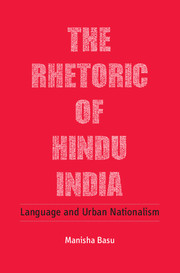Book contents
- Frontmatter
- Dedication
- Contents
- Preface
- 1 Introductory Matters: The Strange Case of Secular India
- 2 Time's Victims in a Second Republic: New Histories, New Temporalities
- 3 To Make Free and Let Die: The Economics of Metropolitan Hindutva
- 4 A Power over Life and Rebirth: V. D. Savarkar and the Essentials of Hindutva
- 5 Between Death and Redemption: Hindu India and its Antique Others
- 6 The After-Life of Indian Writing in English: Telematic Managers, Journalistic Mantras
- Bibliography
- Index
3 - To Make Free and Let Die: The Economics of Metropolitan Hindutva
Published online by Cambridge University Press: 23 July 2017
- Frontmatter
- Dedication
- Contents
- Preface
- 1 Introductory Matters: The Strange Case of Secular India
- 2 Time's Victims in a Second Republic: New Histories, New Temporalities
- 3 To Make Free and Let Die: The Economics of Metropolitan Hindutva
- 4 A Power over Life and Rebirth: V. D. Savarkar and the Essentials of Hindutva
- 5 Between Death and Redemption: Hindu India and its Antique Others
- 6 The After-Life of Indian Writing in English: Telematic Managers, Journalistic Mantras
- Bibliography
- Index
Summary
Manu Goswami and Sukanya Banerjee have argued in their recent writing on the economic discourse of nationhood that there has long been a divide in Indian historiography between economic nationalism and cultural nationalism. The critical privileging of narrative conceptualizations of the national body, they contend, has only served to conceal from view the importance of ‘numbers’ in imagining the nation. Goswami and Banerjee counter this trend by emphasizing that in providing abstract appropriations of a calculable whole made up of equivalent citizens, it was indeed economic challenges to colonial rule that offered the earliest propositions of a unified national aggregate. Banerjee particularly takes up the case of Dadabhai Naoroji's Poverty and UnBritish Rule in India, which appeared at the turn of the century in 1901. This text for the first time presented readers with a statistical estimate of the national income of British India, which, when divided by the population as a whole, in turn yielded the per capita income of the individual Indian citizen. Given the political climate of the time, the per capita income was actually something of a charmed figure, for calculated from the conceptualization of a national whole, this number, through a circular logic, actually consolidated that whole by establishing a numeric correspondence between singular members of the body politic. Describing the role played in nationalist articulations by the per capita income of the individual Indian, Sukanya Banerjee writes that ‘As a figure that derived from and established a functional equivalence between the members of the body politic it thus constituted, the per capita income went a long way toward rendering that body a nation’. Yet, regardless of the foundational status of Poverty in statistically projecting an aggregate of equivalent persons and from there a nationally bounded group, the text, Banerjee tells us, has been largely ignored in cultural analyses of the movements for autonomy. This is because such analyses have routinely disregarded the fact that economic arguments, like many others, unfold through rhetorical and imaginative devices and are not restricted to what is often presented as an ideologically innocent regime of numbers.
- Type
- Chapter
- Information
- The Rhetoric of Hindu IndiaLanguage and Urban Nationalism, pp. 69 - 100Publisher: Cambridge University PressPrint publication year: 2016

